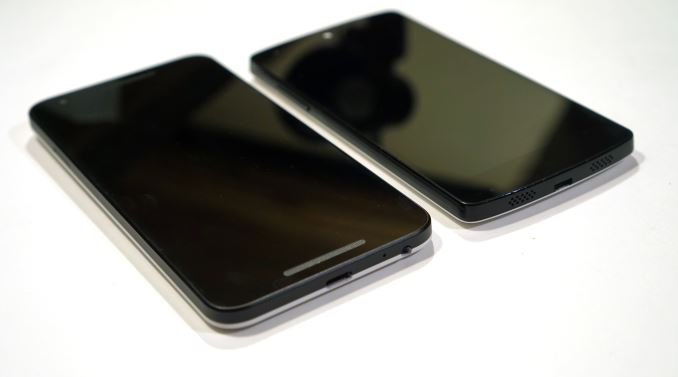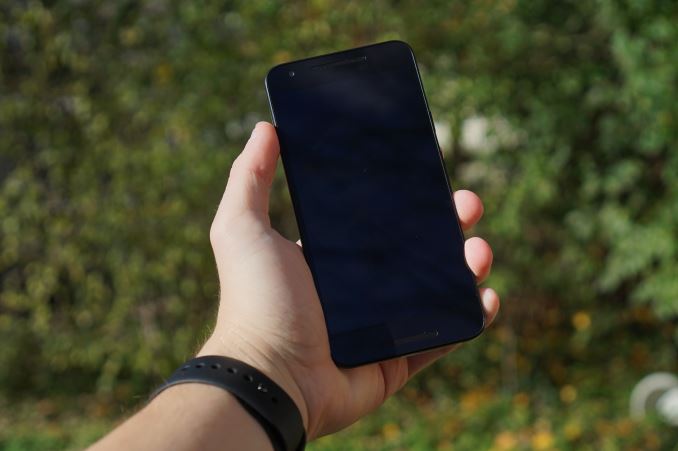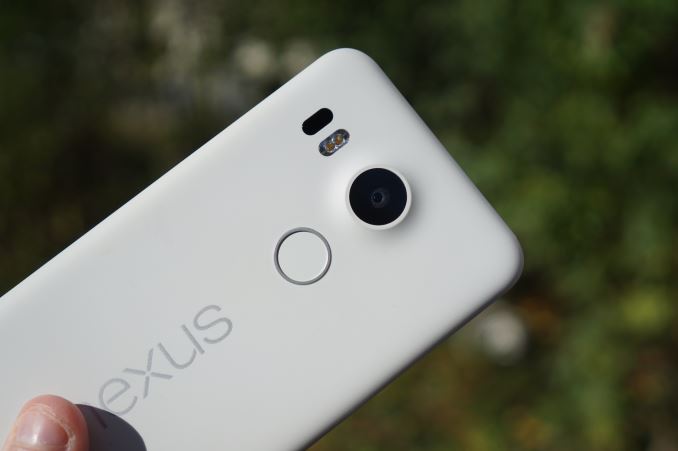The Google Nexus 5X Review
by Brandon Chester on November 9, 2015 8:00 AM EST- Posted in
- Smartphones
- LG
- Mobile
- Android 6.0
- Nexus 5X
Final Words
The Nexus 5X certainly isn't a perfect device. It's not meant to be a flagship phone and it's not priced like one; at $379 it's not the most expensive phone out there, but it's not exactly the cheapest one either. Still, I find myself really liking it despite its flaws. I definitely have a soft spot in my heart for the original Nexus 5, and I was quite disappointed when it didn't receive a true successor last year.
This year's 5X certainly is a true successor, but not every aspect delivers the improvements you would expect from a two year gap between releases. The performance isn't where you'd expect it to be, and Google's stance on disk encryption continues to reduce NAND performance. For all the things the 5X gets wrong though, it gets many other things really right. As always, it's nice to gather everything together in order to decide if a device is worth purchasing.
The design of the 5X is an interesting evolution of the LG Nexus industrial design. It's not as angular as the Nexus 5, but it's still very much a Nexus phone. The design delivered everything I expected from a successor to the Nexus 5, and I like it very much for what it is. The size of the phone is definitely pushing it for me, and I would opt for the size of the Nexus 5 if I had that option, but I also happen to struggle more than most people do with large devices. At $379 there's not much more you can realistically ask for than what the 5X's design and build quality offers.
The 5X's display is awesome, and there's really not much more that needs to be said. The Nexus 5 had a pretty good display for the time, but the 5X definitely takes the calibration and color reproduction to the next level. There's no more messed up low gamma curve, so the display doesn't have the washed out appearance that some people complained about with the Nexus 5's display. Brightness has also been boosted, and contrast is significantly higher too. I really couldn't ask for any more from an IPS LCD panel, and compared to what we got with last year's Nexus 6 the 5X is a breath of fresh air.
Performance is definitely an interesting case. To be frank, the 5X just isn't that much faster in many scenarios than the Nexus 5 was because of the heavy throttling. There's certainly improvement, but it's not what you would expect from two years of SoC progress. Snapdragon 808's heavy throttling means that for any task that taxes the CPU for over a couple of minutes you'd probably be better off with Snapdragon 801, and most certainly better off with 805. It's disappointing, but certainly forgivable when your device costs $379.
As for the GPU performance, Adreno 418 provides a healthy uplift in performance over Adreno 330, and beats Qualcomm's estimates which is great. What's interesting is that the Nexus 6 actually ends up pulling ahead despite being an older phone, which is just the result of how Qualcomm's GPUs were put onto their SoC roadmap. For $379 I think the GPU performance is solid, and there shouldn't be any problems running GPU intensive apps and games from Google Play.
NAND performance is definitely a big area of concern. I don't want to keep beating the issue to death, but Google needs to change their strategy here or they're going to fall very far behind in this regard and there will be no way to catch back up. Devices like the Galaxy S6, and even more so the iPhone 6s have shown how fast NAND speeds can reduce load times, reduce app install times, enable new camera abilities, and do many other things to improve the user experience. The gap between the storage performance of the LG G4 and the Nexus 5X is significant in size despite the two phones using the same NAND solution, and the end result is just completely unacceptable. On top of that, the use of the application processor to perform encryption has an enormous power penalty compared to a dedicated AES engine, which means there are potential battery life improvements just being left on the table.
That said, battery life on the Nexus 5X is quite good, although one should definitely note that the performance the Nexus 5X achieves in tests like BaseMark OS II's battery benchmark is behind that of competing devices that don't use Snapdragon 808 or 810. While it's a bit difficult to weigh these two things, it's essentially a question of whether or not it's worth it for a device to last for a long time when the performance over that period of time wouldn't have provided an enjoyable experience. In the end I think if you need the absolute best performance you're probably not going to opt for a non-flagship phone like the Nexus 5X anyway, and the battery life provided is more than adequate for the average user that will purchase it.
The last major thing to talk about is the camera. This is definitely a home run for Google. After a long period of n-1 cameras, or cameras that were up to par but lacking in processing, we finally get a Nexus device with an awesome camera. Both during the day and at night the quality was better than any of the other devices I used for comparisons, which included the previous two Nexus phones, the Galaxy S6 Edge, and the iPhone 6s. Low light was definitely the biggest victory, although I suspect that the Galaxy Note5 would come closer to the 5X than the S6 Edge does due to the improvements Samsung made to their image processing. In any case, the camera is as good as the flagship devices I've used, which is astonishing for a $379 device. The only drawbacks are the lack of OIS which contributes to shakier video than the previous Nexus phones put out, and the reliance on Google's HDR+ mode to achieve good results which puts a significant delay between shots and could introduce greater blurring in some circumstances. Even with those issues, I really love the Nexus 5X's camera, and it's become my everyday Android phone because of it.
Ultimately, the Nexus 5X is a true successor to the Nexus 5, and for $379 you really can't go wrong when buying one. You're getting a great display, a great camera, a great fingerprint scanner, good battery life, and a chassis that is most definitely plastic, but without any of the flex you see on cheaper devices. For me the camera alone sets the 5X apart from anything else in its price bracket, but pretty much every aspect of it is ahead of the competition at this price point unless you're willing to take a look at imports from Chinese manufacturers, which come with a whole host of other concerns regarding the warranty and network compatibility. The Nexus 5X definitely makes some tradeoffs in order to hit its price target, but if you're looking for a smartphone priced between $300 and $400 I highly recommend you take a look at the Nexus 5X.













197 Comments
View All Comments
zeeBomb - Monday, November 9, 2015 - link
Same! I'm kinda in that position as well. Maybe a Z5 premium review would be cool too.Bob Todd - Monday, November 9, 2015 - link
As someone with 3 OnePlus Ones in his household, I'd tell you to run like hell toward the Nexus. The software situation is kind of a disaster for OnePlus. Fun bugs like this one where your phone won't really work as a phone for lots of users in VoLTE markets (no cellular when connected to WiFi) that go unfixed for months on end.https://jira.cyanogenmod.org/plugins/servlet/mobil...
The issue affects all 5.x radios so OxygenOS is impacted too. Then there's crap like them not fixing the Google Play Services battery drain bug in other patches even though it was a 10 minute fix in framework-res. It wasn't hard to ignore my invite for the OnePlus Two.
yankeeDDL - Monday, November 9, 2015 - link
I owe a Nexus4 and a Nexus5. Both in service and without an issue for 3 and 2 years respectively.The Nexus5 battery is starting to show signs of aging (I do still get 1 full day without charging if I limit the use, but I need to watch it).
I decided to buy a new one, but the thought of getting a new, better phone, is appealing. I owe the N5 32GB. It baffles me how there are still phones around with 8/16GB, as 32GB feels definitely tight. I guess it depends on the use one does of it, but my photos folder easily goes to 6~8GB in few weeks. Add to this 10GB of music, and there's little space for videos, games and what not. So the OnePlus X with a nice 128GB SD card sees extremely attractive, especially at that price point, using an 801 which does not overheat and does not drain the battery, and a decent size screen.
If it was a Nexus, I would not think twice. But it isn't, hence I looked forward to the N5X.
Problems: only 32GB and in Europe, it is priced at 529eur. That's 570usd. Seriously? Unfortunately, yes. The OnePlus X is nearly half of it (supposedly) and it has an SD card and a larger battery and a slightly smaller screen (a plus, in my opinion). The camera will likely not be up to that of the N5X, but still, I have a real camera when I want to take "nice" photos. To "capture the moment", I'm OK with the N5 so, I suppose, I'd be OK with the One+X.
Thanks for the feedback on One+: I do have some colleagues who have it and they did not seem t have any major problem.
UtilityMax - Monday, November 9, 2015 - link
My OnePlus One has been working great, though I have to say I never bothered to upgrade from the original ROM it shipped with some time in March.UtilityMax - Monday, November 9, 2015 - link
Based on reviews I have seen, OnePlus X suffers from the same shorter (not 5X though) battery life, heat and throttle issues as any other device using the current crop of the 64-bit Snapdargon SoCs. I have heard from a bunch of people already that they'd rather hang onto their old phones than buy the ones with the current 64-bit Snapdragon SoCs. I have one OnePlus One phone in the family, and I have to agree with them. The One is still a fantastic phone, and you can buy the 64GB version for $300 in the USA, no invites necessary.If you do want to buy one of those two, OnePlus X seems like a nice deal on paper, in the sense that all specs look slightly better.
UtilityMax - Monday, November 9, 2015 - link
Err.. sorry, I was talking about OnePlus 2 above. The OnePlus X is an excellent smart phone, but unfortunately it lacks the bands for optimal LTE service in the USA.DukeN - Monday, November 9, 2015 - link
Good job as always not giving two fucks about non-Apple devices Anandtech.Apple devices - reviews on the first day of release/reveal.
Anything else - we'll get around to it (This is like five weeks after the first reveal). And uh, maybe should have reviewed the 6P which is probably the best handset around?
No wonder this place is in the toilet relative to a few years back.
Brandon Chester - Monday, November 9, 2015 - link
The iPhone 6s was released on Sept 25, our review went up on Nov 2. The Nexus 5X was released on Sept 29, and this review has gone up on Nov 9. Accounting for the fact that we don't publish on weekends the gap was the same. I don't see how we give preference to Apple devices at all.Furthermore, I received the 5X well after other publications did, and Google didn't send a 6P along with it. We just sourced one from Huawei and so that review will take some time to do properly. Google's lack of organization in getting press hardware and software in a timely manner is why, for example, I can have an iOS review done for launch day but not an Android Marshmallow one.
Also, if you're going talk about things a few years back I suggest you look at how long the HTC One M7 review took. Doing things right takes time, and there are lots of other places to get a 24 hour review.
trekinator - Monday, November 9, 2015 - link
Thanks Brandon. Most of us appreciate the time it takes to do things right.bw13121 - Monday, November 9, 2015 - link
I'll second that. Fantastic quality and in depth review. There are those of us who do appreciate the quality and technical depth of your reviews, as most reviews are that light on detail they are useless!